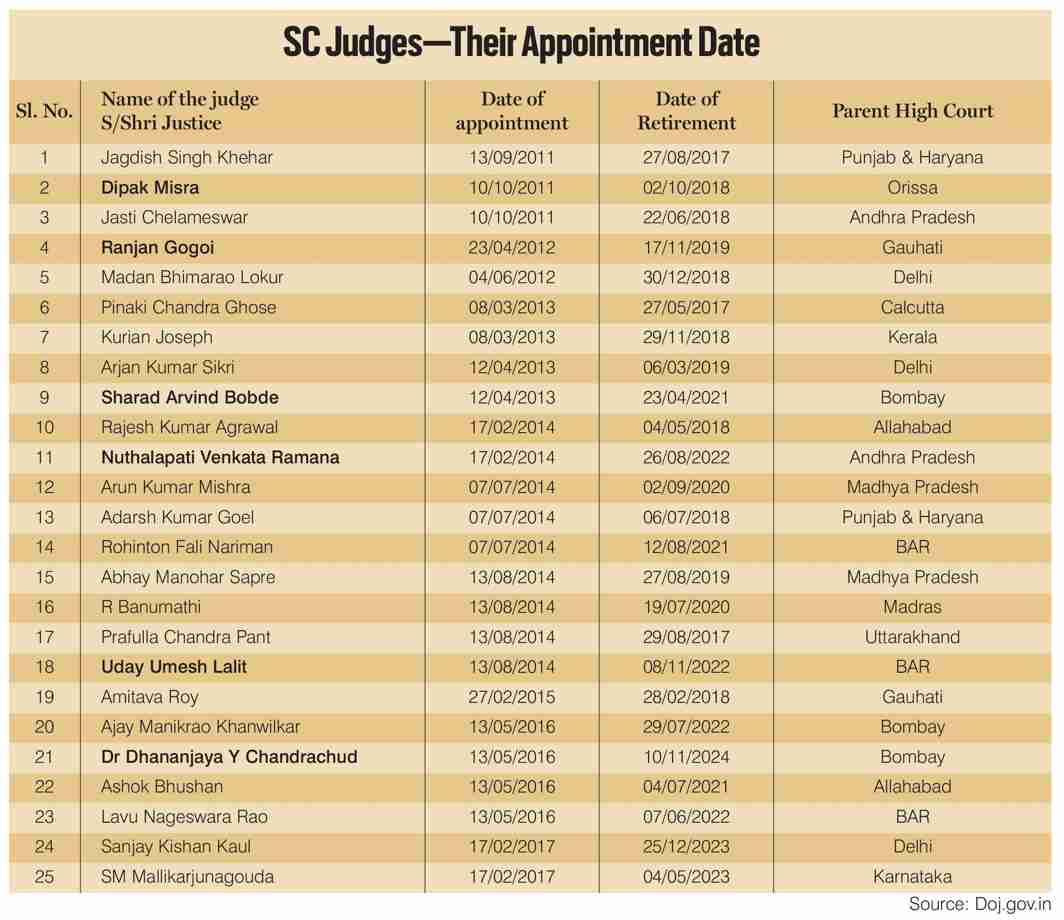Above: During his 20-year stint on the bench, Justice Misra has passed some path-breaking verdicts. Photo: symlaw.ac
With Justice Misra being designated the chief justice of India, upgradation of legal services and dispensation of justice to the have-nots will be the order of the day
~By Rupinder Suri
Justice Dipak Misra will be sworn in as the 45th Chief Justice of India (CJI) on August 27. A pro-citizen judge known for his bold judgments, he was born on October 3, 1953, and is a nephew of Justice Ranganath Misra who was the Chief Justice of India from September 1990 to November 1991.
Justice Misra was born into an illustrious family and made a handsome contribution to judiciary as well as public service. Enrolled as an advocate at the Bar on February 14, 1977, he started his career practising in constitutional, civil, criminal, revenue, service and sales tax matters in the Orissa High Court and tribunals before being elevated to the High Court bench.
Appointed as an additional judge of the Orissa High Court in 1996, Justice Misra was transferred the following year to the Madhya Pradesh High Court, where he was made a Permanent Judge on December 19, 1997. In December 2009, he was appointed Chief Justice of the Patna High Court and served until May 2010, when he was appointed Chief Justice of the Delhi High Court.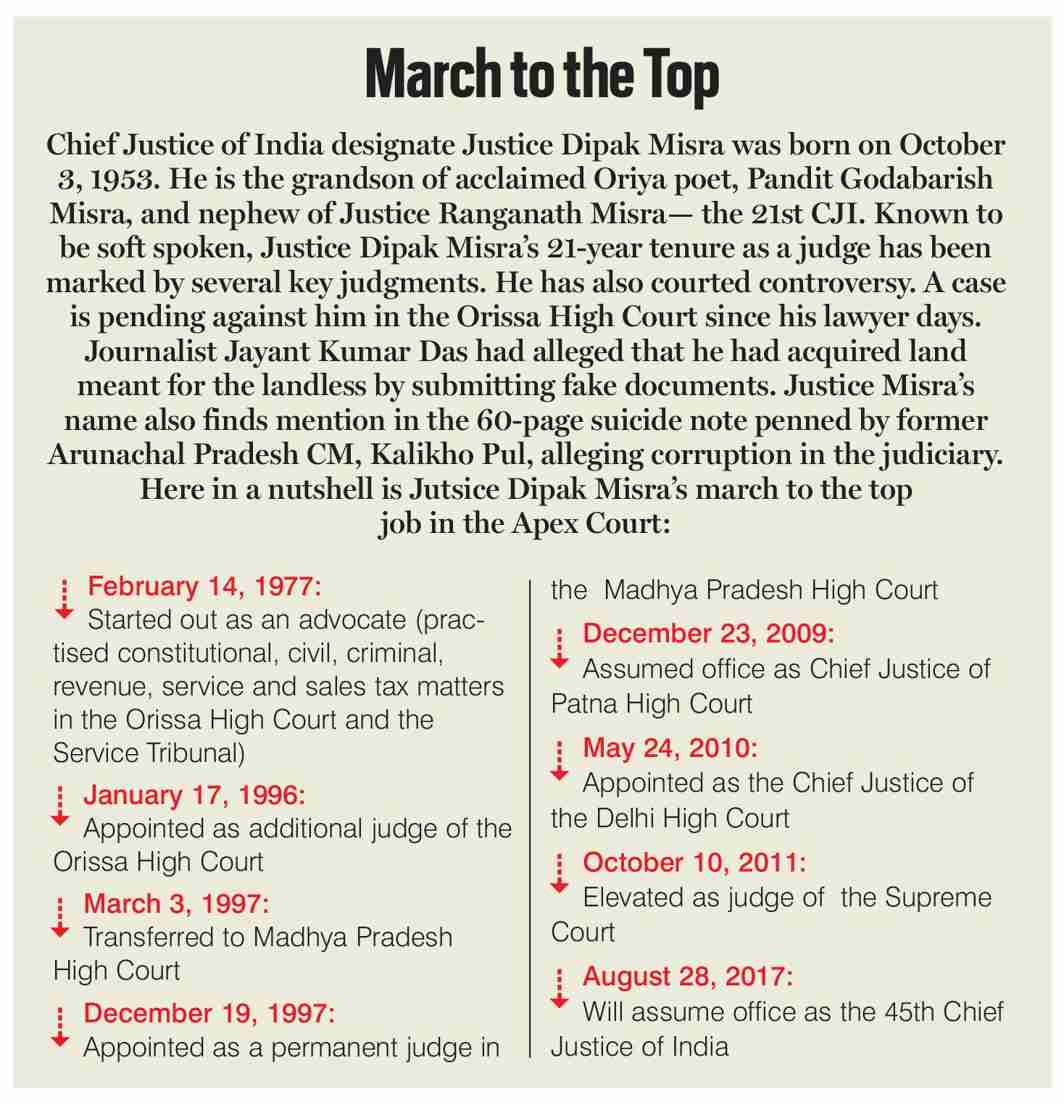
He was elevated to the Supreme Court on October 10, 2011. He performed his service honestly for almost seven years. He is the man behind “Legal Assistance Establishments” or Nyaya Sanyog, which caters to poor litigants and families of those undertrials who are languishing in jails so that they get quick access to justice. He has always shown a concern for providing speedy and qualitative justice for the poor, the downtrodden and weaker sections of society.
Landmark Judgments
- July 1, 2015: No compromise marriages in rape cases: A Supreme Court Bench headed by Justice Dipak Misra said that any compromise promising wedlock between a rape accused and the victim compromises the dignity of the woman.
- July 2015: Justice Misra was among three judges who were up all night in a historic hearing to decide Yakub Memon’s last-minute appeal against his hanging for the 1993 Mumbai blasts. At 5 am on July 30, it was Justice Misra who announced the Court’s decision: “Stay of death warrant would be a travesty of justice. The plea is dismissed.” Memon was hanged two hours later.
- May 13, 2016: Criminal Defamation law not unconstitutional (Subramanian Swamy vs Union of India): The Bench comprising Justices Dipak Misra and PC Pant held that the Right to Life under Article 21 includes right to reputation. The Bench dismissed the petitions filed by Swamy, Rahul Gandhi and Arvind Kejriwal challenging the law relating to criminal defamation in India.
- July 13, 2016: A constitution bench unanimously quashed Arunachal Pradesh governor JP Rajkhowa’s decision to advance the assembly session from January 14, 2016. The bench, in three separate judgments by Justices Khehar, Dipak Misra and Madan B Lokur, paved the way for the return of Congress-led Nabam Tuki government to power.
- November 30, 2016: A Supreme Court bench of Justices Dipak Misra and Amitava Roy made it mandatory for all cinema theatres to play the national anthem before a movie, during which the national flag is to be shown on the screen.
- May 5, 2017: Justice Dipak Misra led the bench that confirmed death to four convicts in the Nirbhaya gang-rape case of 2012. The verdict was welcomed with spontaneous applause in the visitors’ gallery.
—By Rajesh Kumar
CONTRIBUTIONS
The present Chief Justice of India JS Khehar and he have had a perfect understanding and they have moved in unison for the upgradation of the judiciary. During the last one year, perhaps more judges have been appointed in high courts and the Supreme Court than in any previous year. This was achieved in spite of the fact that the vires of National Judicial Appointments Commission Act, 2014 was declared bad in law by the Supreme Court.
One of his landmark judgments was In Court on its own motion vs State, wherein he held that FIRs should be uploaded on the Delhi Police website within 24 hours of their lodging so that the accused can download the same and file appropriate applications before the Court for redressal of grievances.
Justice Misra is a man of impeccable character. Above all, he is a fine human being. He is an outstanding judge, complete in all respects. I have witnessed many a time when he would encourage young lawyers to argue confidently in court. His administrative qualities are superb as well. He is a polite and a well-mannered judge but with a strong sense of conviction, especially while at the cross-roads and facing dilemmas.
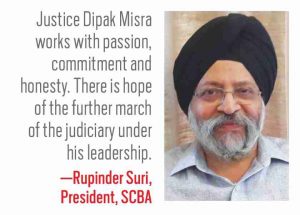 He has shown vision with remarkable clarity of thought and ideas. His ability to understand an issue and resolve the dispute is unparalleled. He also headed a three-judge bench which upheld the Delhi High Court’s verdict sentencing to death four convicts of the December 16 gangrape-cum-murder case in Delhi and also held special hearings on Saturdays for it. “The “brutal, barbaric and diabolic nature” of the crime could create a “tsunami of shock” to destroy a civilised society, said the verdict penned by Justice Misra.
He has shown vision with remarkable clarity of thought and ideas. His ability to understand an issue and resolve the dispute is unparalleled. He also headed a three-judge bench which upheld the Delhi High Court’s verdict sentencing to death four convicts of the December 16 gangrape-cum-murder case in Delhi and also held special hearings on Saturdays for it. “The “brutal, barbaric and diabolic nature” of the crime could create a “tsunami of shock” to destroy a civilised society, said the verdict penned by Justice Misra.
He also headed the bench which, in an unprecedented pre-dawn hearing in 2015, rejected last-ditch efforts by Yakub Memon to get his execution stayed. He is also strict about frivolous litigation. He rejected one such petition that objected to the title of the film, Dhobi Ghat.
It will be difficult to write about his persona in few lines. He is definitely a man who works with passion, commitment, sincerity and honesty. There is hope of the further march of the judiciary under the leadership of Justice Dipak Misra. This will be even while ensuring the highest standards of ethics, probity and dispensation of justice to the have nots, the weak and the poor and also for the welfare of women and minorities. The Bar is sure that the relations between it and the Bench would strengthen further during his tenure.
The Indian judiciary will be in safe hands as Justice Misra will make sure that the ideals of the constitution are upheld.
—The writer is President, Supreme
Court Bar Association of India
The next in Line…
These five judges will be future chief justices of India if the seniority tradition is followed
- Justice Ranjan Gogoi (DoB November 18, 1954)
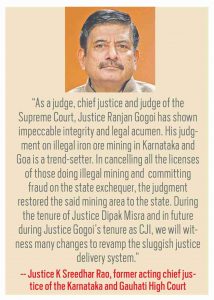
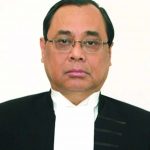 Born to former Assam CM KC Gogoi, Ranjan Gogoi joined the Bar in 1978. He practised at Gauhati High Court before being appointed permanent judge of the same court on February 28, 2001. He was later transferred to Punjab & Haryana High Court on September 9, 2010. He became a Supreme Court judge on April 23, 2012. After Justice Dipak Misra, he is the senior-most judge to take over as CJI and his tenure will begin in October 2018.
Born to former Assam CM KC Gogoi, Ranjan Gogoi joined the Bar in 1978. He practised at Gauhati High Court before being appointed permanent judge of the same court on February 28, 2001. He was later transferred to Punjab & Haryana High Court on September 9, 2010. He became a Supreme Court judge on April 23, 2012. After Justice Dipak Misra, he is the senior-most judge to take over as CJI and his tenure will begin in October 2018.
Retirement date: November 17, 2019
Major judgments:
- Allowing women to be manager of a joint family
- Banning politicians’ photographs in government ads
- Terming Jat reservation as unconstitutional
- Justice Sharad Arvind Bobde (DoB April 24, 1956)
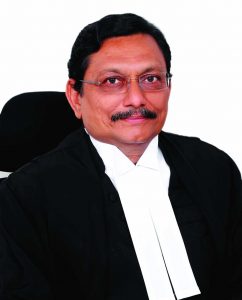 Born to Arvind Shrinivas Bobde, a former advocate general of Maharashtra, he enrolled with the Bar Council of Maharashtra in 1978. He was elevated as additional judge to this High Court in March 2000. In 2012, he was made chief justice of the MP High Court and in April 2013, was made a judge of the Supreme Court.
Born to Arvind Shrinivas Bobde, a former advocate general of Maharashtra, he enrolled with the Bar Council of Maharashtra in 1978. He was elevated as additional judge to this High Court in March 2000. In 2012, he was made chief justice of the MP High Court and in April 2013, was made a judge of the Supreme Court.
Retirement date: April 23, 2021
Major judgments:
- Permiting abortion of 25-week-old fetus with neurological disorder
- Staying BCI notification regarding age bar for studying law
- Nuthalapati Venkata Ramana (DoB: August 27, 1957)
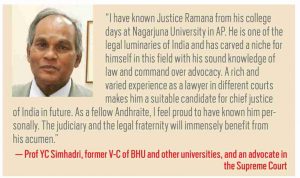
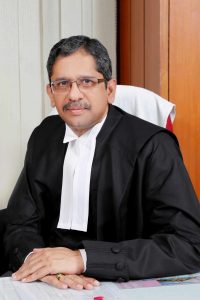 Born into an agricultural family in Andhra Pradesh, he started his legal career in 1983. He is an expert on constitutional, criminal, service and inter-state river laws. He has been additional standing counsel for the centre and additional advocate general of Andhra Pradesh. He was chief justice of the Delhi High Court and acting chief justice of the Andhra Pradesh High Court.
Born into an agricultural family in Andhra Pradesh, he started his legal career in 1983. He is an expert on constitutional, criminal, service and inter-state river laws. He has been additional standing counsel for the centre and additional advocate general of Andhra Pradesh. He was chief justice of the Delhi High Court and acting chief justice of the Andhra Pradesh High Court.
Retirement date: August 26, 2022.
Major judgments:
- Verdict on women managing joint family
- Upholding the principle of “relevant turnover” for determination of penalties in competition law contraventions
- Uday Umesh Lalit (DoB: November 9, 1957)
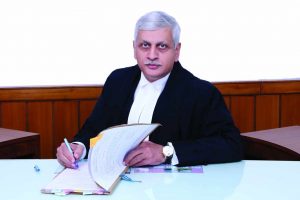 Son of criminal lawyer UR Lalit, UU Lalit joined the Bar in 1983 and commenced his practice in the Supreme Court in 1986. He was designated a senior counsel in April 2004. He was Amit Shah’s lawyer in the fake encounter cases of Sohrabuddin Sheikh and Tulsiram Prajapati, and was special prosecutor for the CBI in the 2G Spectrum case. He became a Supreme Court judge in August 2014.
Son of criminal lawyer UR Lalit, UU Lalit joined the Bar in 1983 and commenced his practice in the Supreme Court in 1986. He was designated a senior counsel in April 2004. He was Amit Shah’s lawyer in the fake encounter cases of Sohrabuddin Sheikh and Tulsiram Prajapati, and was special prosecutor for the CBI in the 2G Spectrum case. He became a Supreme Court judge in August 2014.
Retirement: In November 8, 2022
Major judgments:
- Misuse of 498A of the IPC in dowry cases
- Ending impunity for the Armed Forces
- Member of the five-judge bench on Triple Talaq
- Dhananjaya Y Chandrachud (DoB: November 11, 1959)
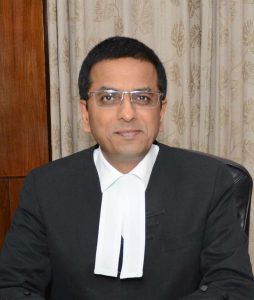 Son of India’s longest-serving chief justice, YV Chandrachud, Dhananjaya Y Chandrachud did his LLB from Delhi University in 1982, LLM from Harvard University on an Inlaks Scholarship in 1983 and Doctorate of Juridical Sciences from Harvard in 1986. He practised law at Bombay High Court and the Supreme Court, and was designated additional solicitor general of India in 1998. In March 2000, he became a judge of the Bombay High Court and in October 2013, chief justice of the Allahabad High Court. In May 2016, he was appointed a judge of the Supreme Court.
Son of India’s longest-serving chief justice, YV Chandrachud, Dhananjaya Y Chandrachud did his LLB from Delhi University in 1982, LLM from Harvard University on an Inlaks Scholarship in 1983 and Doctorate of Juridical Sciences from Harvard in 1986. He practised law at Bombay High Court and the Supreme Court, and was designated additional solicitor general of India in 1998. In March 2000, he became a judge of the Bombay High Court and in October 2013, chief justice of the Allahabad High Court. In May 2016, he was appointed a judge of the Supreme Court.
Retirement date: November 10, 2024
Major judgments:
- Rap on the knuckles to BCCI for trying to mislead the Court
- Directing the government to formulate a national policy on drug abuse



